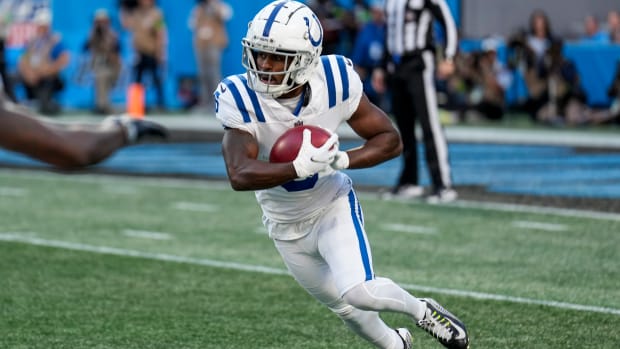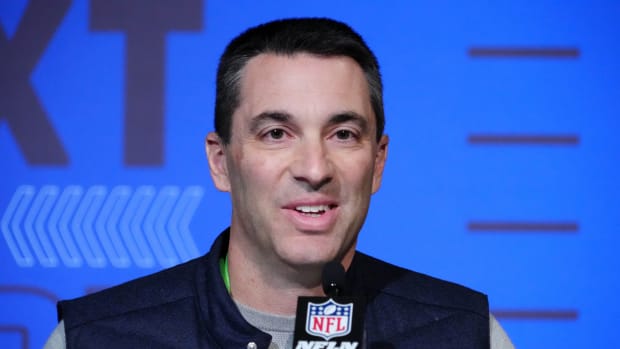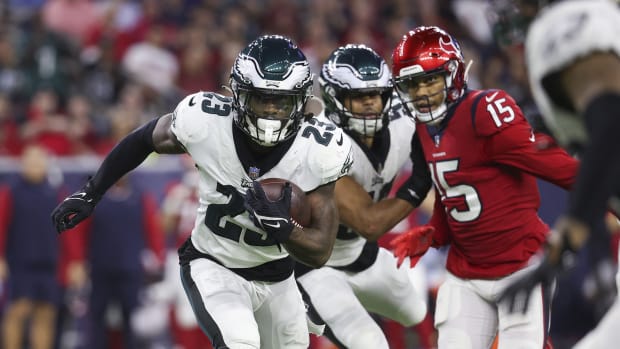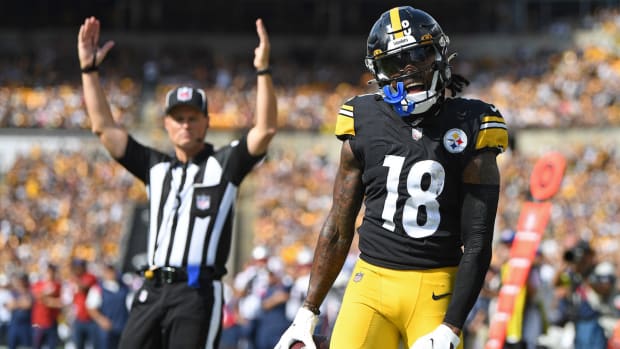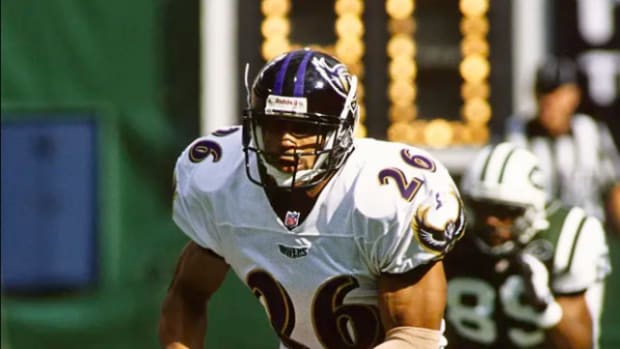The NFL Now Frequently Outsources Independent Investigations, But Do They Really Get to the Heart of the Problem?
This story appears in the July 30, 2018, issue of Sports Illustrated. For more great storytelling and in-depth analysis, subscribe to the magazine — and get up to 94 percent off the cover price. Click here for more.
When the ex-girlfriend of LeSean McCoy suggested to police that the Buffalo Bills running back might be behind a home invasion and robbery that left her badly beaten, the NFL announced that it was reviewing the matter. The League's senior vice president and special counsel for investigations, Lisa Friel, has started the investigation with her department, but if recent history is any indication, the league could soon announce an "independent investigation," as it has done with other potentially combustive matters—from the Miami Dolphins' bullying scandal to Ray Rice's domestic violence charge to Deflategate.
This has become the normal course of action for the league to quell any public firestorm and to mitigate charges that it is acting too slowly, not acting at all or too conflicted to reach an unbiased conclusion. But these investigations don't come cheap; according to a league source, the going rate for an investigator—invariably a partner at a white shoe law firm—hovers around $1,200 per hour plus expenses, which can include the labor of an associate. What does the league get for this exercise? SI examined a recent NFL independent investigation, and the unmistakable conclusion? The NFL's outsourcing makes for slick and effective, if expensive, damage control. As for the rigor of the actual fact-finding, that's considerably less clear.
On Dec. 17, SI reported that multiple former Carolina Panthers employees had accused owner Jerry Richardson of sexual harassment and of using a racial slur. Hours before the story came out, the NFL announced that it would be conducting an investigation. After publication Richardson said that he was selling the team and ceding day-to-day operations immediately.
A month later, at his Super Bowl press conference, commissioner Roger Goodell told reporters that the Panthers' investigation would be handled by Mary Jo White, a former federal prosecutor and SEC chair who had previously overseen the 2010-12 New Orleans Saints Bountygate investigation. "She will do her work," said Goodell. The Panthers, he said, would "give her full cooperation."
Early on the team sent an email to every employee containing contact information both for White and a colleague from White's New York law firm, Debevoise & Plimpton. "We do not know who Ms. White contacted," Panthers spokesman Steven Drummond told SI. "We sent her contact information to the entire staff and made clear that there would be no retaliation for participating in the investigation, as per company and League policy. If someone requested to speak to the investigators, we quickly provided that information to them."
Though the staff was informed of the process through emails, multiple employees, who say they were willing to speak with White, were never contacted and were surprised by the passivity of the investigation. "The burden was on [women] to come forward," says one employee, a male, who has been with the team for more than 10 years. "Shouldn't an investigator actually investigate?" One former employee, who reached a settlement with Richardson, says, "I have spoken with other people who were in the same situation I was in, and none spoke to the league or were contacted."
According to multiple sources, Richardson declined to make himself available to White. And the NFL, despite the leverage it held in being in position to approve the Panthers sale, would not demand his cooperation. So, with no ability to compel testimony, much less the subpoena power a government agency might wield in a similar probe, White was forced to rely on other avenues and sources to investigate Richardson.
One complication for investigators: The owner had effectively bought the silence of the objects of his offensive workplace conduct, negotiating significant financial settlements in exchange for their signing nondisclosure agreements.
Correspondence obtained by SI reveals that at least two victims of Richardson's harassment were eager to speak with White and share their experiences. But they withdrew their offers, absent a guarantee that speaking would not jeopardize their settlement payments. Says one female former employee, "The league did not want to stand up and say, 'We'll protect you; we just want to get to the truth.' So that makes you think, Are you really trying to get to the bottom of this? Or are you just doing this for show?"
Writing for SI.com in April, one former Panthers employee who had signed an NDA with Richardson described the investigation as "bogus." A current employee says, "Some of the most obvious people in the 200 level [where the Panthers' executive offices are located] were never contacted.... They betrayed a lot of people. And this is a bigger deal than the NFL is making of it."
Throughout the spring, potential buyers proffered bids for the Panthers. In May, owners approved the sale of the team to Pittsburgh hedge-fund billionaire David Tepper for $2.275 billion, a record for an NFL franchise.
On June 28, the NFL released White's report, which substantiated the allegations against Richardson. White also suggested in the report that the NFL prohibit NDAs, since they discourage the reporting of violations, and recommended that any claims of workplace harassment at the team level be reported to the league. (White's recommendations will be presented to the NFL's Conduct Committee before the upcoming season.)
In the wake of White's findings, the league fined Richardson $2.75 million, "most of which will be used to support the work of organizations dedicated to addressing race and gender-based issues in and outside of the workplace." (It is the largest fine in NFL history; it also represents barely 0.1% of the Panthers' sale price.)
Multiple sources told SI that during his 25 years as owner, Richardson had been abetted by enablers, who contributed to making the club a hostile workplace. Asked recently whether any Panthers employees other than Richardson had been disciplined or fired because of their role in the scandal, Drummond responded, "Yes." (He declined to provide further specifics.)
Yet White's report mentions only Richardson and makes no reference to an enabling culture: "The improper conduct was limited to Mr. Richardson. No other employee of the Panthers is alleged to have engaged in such conduct, and the review did not discover evidence of similar conduct by other employees of the club."
On July 10, 12 days after the release of White's report, Tepper was introduced at a news conference as Carolina's new owner. He was asked about the harassment scandal, the impetus for the sale. "That was then; this is now," he said multiple times. Tepper also conceded that he was "contractually obligated" to keep the 13-foot statue of Richardson outside Bank of America Stadium. "This was a dagger," says one former Panthers employee. "[Richardson] is in control, even when he's not."
The day before Tepper was introduced, Tina Becker, who had risen meteorically from the Top Cats dance team coordinator to the Panthers' president, resigned. Two days later Carolina's longtime general counsel, Richard Thigpen, was fired.
Deborah Epstein, a professor of law at Georgetown and codirector of the law school's Domestic Violence Clinic, was not surprised by the way the investigation was conducted. On May 23 she resigned from the NFLPA's commission on domestic violence, frustrated by what she says was a lack of conviction: "Through my window into professional football, I just haven't seen any evidence that—other than taking action to improve their public image—they are actually concerned with adopting policies that improve the lives of women harmed within the orbit of professional football."
Goodell sees it differently. After White's report he issued a statement summarizing her findings. He concluded: "I appreciate Mary Jo White's careful and thorough examination of these issues, and her thoughtful recommendations to the Panthers and the entire NFL. Her recommendations will help ensure that our workplaces are open, inclusive and respectful."
• Question or comment? Email us at talkback@themmqb.com.
































